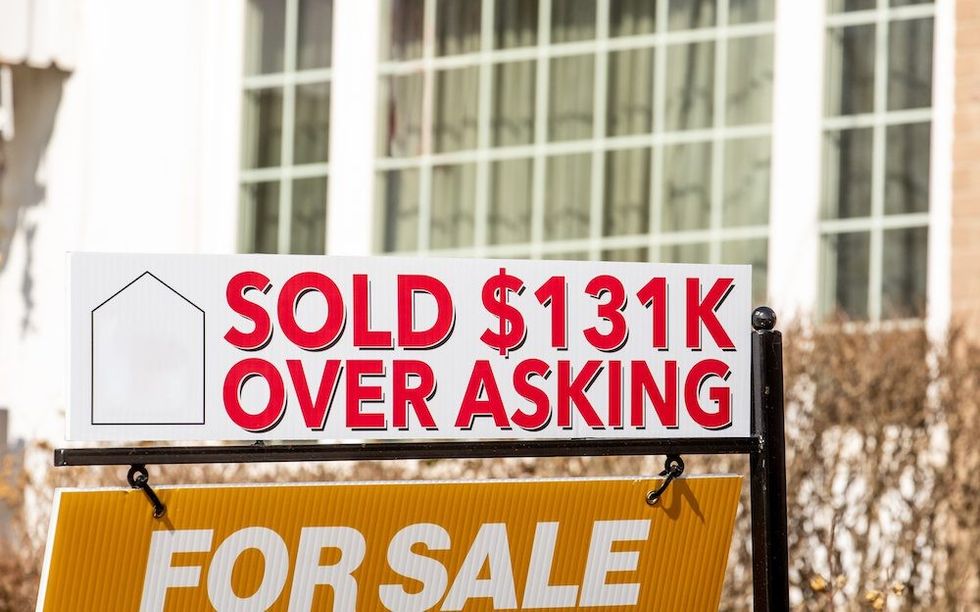The housing market is taking a toll on both bank accounts and on mental health.
Most new -- and would-be new -- homeowners don’t need the reminder that the Canadian real estate market has soared to new heights in the past two years, as it smashed price records, dramatic bidding wars became part of the game, and supply became tighter than ever.
Canada-wide, the average price for a home in the country just passed $800K for the first time on record in February. Canadian homebuyers can now expect to drop $816,720 on a home, a figure that’s up 20.6% from the same time last year, according to the latest figures from the Canadian Real Estate Association (CREA).
The Greater Toronto Area (GTA) in particular saw home prices rise so high that most young people -- even those with high-paying jobs -- could only afford them if they were among the lucky set who received down payment gifts from the bank of the parents. In February, the GTA saw another month of double-digit price increases. The average price for a home in the region has officially climbed to a tough-to-swallow $1,334,544 -- a year-over-year increase of 27.7%, and up 7.3% month over month. This means that it will now require a minimum down payment of $359,441 to buy a basic detached home in the GTA. And if you’re looking to reside in Toronto proper, this figure jumps to a cool $414,798. Ouch.
These prices have even inspired former GTA residents to move out of province to more affordable pastures in places like the Maritimes as of late. But this province-hopping trend isn't doing local populations any favours on the housing front, as newcomers jack up home costs, pricing countless people out of the market in the process.
For many, the ramifications of a defeating housing market -- one characterized as a crisis -- are having an impossible-to-ignore impact on mental health. And at a time when the relentless pandemic has rendered Canadians' mental health more fragile than ever, nonetheless.
The Great Canadian Dream of homeownership -- something once seen as a life milestone -- is no longer a widespread reality. In fact, according to last year’s Spring Housing Poll from RBC, one-third of Canadians under the age of 40 have kissed the dream of homeownership goodbye. And prices have only climbed to record-smashing heights across most of the country in the year since.
In more recent stats, according to the new RBC Annual Home Ownership Poll, housing costs are stressing people out across the country. Almost half (47%) of respondents say that thinking about buying or saving for a home as prices rise is causing stress in their relationship, while the majority (54%) are stressed knowing they may need to buy a home farther away from family and friends. Furthermore, 30% say that, thanks to increasing prices, they have to or will need to live with their parents longer in order to save enough to buy a home.
Despite the drastically different times, young people inevitably compare themselves to their parents, who were able to buy homes when they were their age, when home prices and mortgages were a lot more attainable.
“Many young people are feeling like home ownership is an impossible reality,” says Dr. Saunia Ahmad, Director and Clinical Psychologist at the Toronto Psychology Clinic. “The critical thing to remember is that a house is supposed to be a place where you can set your roots and have a long-term place to live. It’s not just that a real estate investment can make you money; stocks can do that too. With real estate, you have a home and there’s a psychological sense of safety in that.”
For those who do try to enter the market, house-hunting isn’t exactly a relaxing process, especially for those on tight budgets. “The bidding wars have been demoralizing for people,” says Ahmad. “Think about the amount of time looking for houses, getting excited, and then not getting it.”
This can take a substantial toll on one’s wellbeing, says Ahmad. And, most people who’ve even attempted to entertain the idea of buying in this hot market would probably agree.

“It has been tough on some of my clients,” says Toronto-based realtor Ian Matthews. “In the past few months, the inventory has been so low that it has been very discouraging for some, with many properties selling with 10 or more offers. I think this, combined with two years of Covid lockdowns, and recent news from Ukraine, has caused some people to feel like they have no control of their future in a crazy time.”
Matthews points to the fact that many Toronto properties -- especially those under the $2M mark -- are selling with many offers, or with pre-emptive offers one or two days into the listing. He also points to the trend of agents listing homes at incredibly low prices to attract more attention from prospective buyers.
“This is causing buyers to rush to see places with hope, many of which are priced to go $500K or more over asking,” says Matthews. “When this happens week in and week out, it becomes really discouraging. I have been trying to manage expectations for clients and have been encouraging them to take time off to reset when it is needed.”
Following his advice, Matthews says some clients are now house-hunting in spurts. “They’re seeing a number of properties in a few weeks and then vanishing for a period of time,” he says. “I think for a lot of buyers, it has become a bit of a rollercoaster and it can get pretty emotional, so taking breaks is often needed.”
Move-Up Buyers Are Also Under Stress
But it’s not just first-time buyers who are stressed out.
“I have a few clients looking to buy and then sell,” says Matthews. “They are concerned that they will buy at these prices and the market will shift, leaving them in an awkward position. Buying in this market and not being able to sell in this environment could make their purchases unaffordable. I am hoping the spring market will bring with it more inventory which will offer more stability. Though I don't forecast prices coming down this spring, I hope that more inventory will help things seem more rational.”
Even when the deal is sealed on a new home, the stress doesn’t end. For some, it’s just beginning. For many couples, this stress may be a true test of the strength of their relationship. Through her work in couples therapy, Ahmad says finances place a lot of stress on relationships, especially if it involves a substantial amount of debt.

The Toll Stress Takes on Homeowner Relationships
“I have found that there’s often a discussion among couples surrounding the stress of having to finance a mortgage,” says Ahmad. “I have clients who have just jumped into the market and bought houses, and now they are dealing with stress related to the cost of contractors, improving the house, and -- of course -- paying the mortgage. It’s a huge commitment to buy a house and not everyone is prepared for it.”
Ahmad says that financial stress can take away from a couple’s relationship and requires a large degree of solid communication, which may be easier said than done. “Especially in the past two years, people had no choice but to buy further outside of the city; so, now they have long commutes on the GO train or in their cars,” she says. “That could mean a whole two hours of their lives each day spent commuting -- that really takes away from time spent with families. Some couples simply don’t have time to focus on effective communication.”
Furthermore, those who could only afford to buy far away from their physical office spaces may have no choice but to opt for full-time remote work, if their job allows. And -- despite the removal of a maddening commute from the daily equation -- this can bring its own mental health ramifications, too.
“Working remotely is great, but there are psychological risks to working from home full-time and having work-life blend into home-life. It does remove a sense of both general connectivity and human connection the more we spread out and rely on remote work,” says Ahmad. This is particular true after two years of COVID-19-inspired isolation measures. “Many people can lose connections from friends when they move far away,” says Ahmad.
Those who opted to live closer to urban confines may find themselves in less-than-ideal living situations as well when the home they can afford isn't exactly the home of their dreams. “Because of these high prices, people are now crammed into smaller houses -- whatever they could afford -- and not getting the house they actually wanted, so that has an impact on their mental well-being, along with the cost,” says Ahmad.
In addition to stress on existing relationships, home prices may impact who people choose to date in the first place (don’t shoot the messenger). For example, when it will take nearly 30 years to save for a down payment for a Toronto home for someone who makes $200K, the reality is that two professionals who make $50-$75k a year are probably not going to be able to afford to buy a home without a generous gift from the parents (or a winning lottery ticket).
Furthermore, Ahmad points to a growing number of couples who worry about whether they can afford to have children in the absence of a large enough home to accommodate a family. “The cost of housing is permeating into so many aspects of our lives; who we date, whether we have kids, and the type of jobs we have,” says Ahmad.
And this stress is only compounding Canada's incredibly serious mental health crisis. If that isn't incentive enough for some impactful change on the housing policy front, frankly, I don't know what is.





















